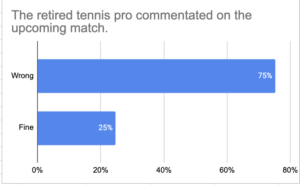If you’re into sports, entertainment, politics, the news — you encounter commentators all the time. Heck, even the spelling bee has commentators. And that word, “commentator,” has been around since the 1400s without much fuss.
The verb “commentate,” though — it gets people positively riled up.
Despite the uproar, “commentate” isn’t as new as you’d think. The Merriam-Webster Dictionary of English Usage traces it back to the late 18th century although it really took off around 1990, if you look at a Google Ngram search.
Merriam-Webster also says that although “commentate” is widely disparaged in the United States, they “know of no British denigration of the word” (which actually fits with comments I’ve seen from British people on my Facebook page: they’re surprised we Americans get worked up about it.)
In fact, a surprising Facebook poll I did recently is why I’m talking about it today. I’ve been running little polls about traditionally troublesome words to see if opinions have changed over time.
The American Heritage Dictionary has results from surveys they did a while ago, and I find it interesting to compare those results to what people think now, although it’s certainly not scientific.
In this case, the sentence was “The retired tennis pro commentated on the upcoming match.”
That was back in 2004, and 85% of the Usage Panel rejected this use of the word “commentate.”
I almost didn’t do a survey on it because I thought nearly everyone would say the sentence was wrong based on the complaints I usually hear about the word. It regularly comes up when I do radio interviews as something people really don’t like, along with “orientate” and “conversate.”
So I was a little surprised when the poll found that only 75% of the people who responded on Facebook said “commentate” is wrong.
So what are those 25% who say it’s fine thinking? Well, some of them said you can’t use “commenting” to describe what commentators do. They say those former spelling bee champs telling us why the schwa sound makes a word hard to spell are doing more than just making comments. So we need a different word to describe what they’re doing, and “commentating” is that word.
The Merriam-Webster Dictionary of English Usage makes the same argument, and I tend to agree. Further, since people have the job title “commentator,” it makes logical sense that they would “commentate.” This is one of the ways we make new words in English. It’s called “backformation.” The verb “edit” was actually formed this way from the noun “editor.” Editors edit, and commentators commentate.
But what surprised me more than a little was that Garner’s Modern English Usage makes the same argument about the two words having different meanings and says that “commentate” as a verb is “Stage 5: fully accepted.”
I have never seen Garner be more permissive than the general public, and it uses a 1-5 rating scale that has options such as “Stage 4: virtually universal but opposed on cogent grounds by a few linguistic stalwarts.” I would probably place it at his Stage 3: “commonplace even among many well-educated people, but still avoided in careful usage.”
It’s possible Garner puts “commentate” at Stage 5 because it’s used in academia in a way that isn’t familiar to me. He mentions “scholarly commentators,” and he also calls TV people who use the verb “commentate” grandiose. So he doesn’t love it for TV commentators.
So, what should you do given that most of the public hates “commentate,” but someone like Bryan Garner says it’s completely fine?
Well, consider your audience. Apparently, “commentate” is acceptable in academia, and I suspect most sports fans wouldn’t have a problem with it since the industry has so many commentators. British audiences also don’t mind.
But if you’re writing for a general American audience, especially one that isn’t exposed to a lot of commentators, I’d still avoid it.
I don’t think it’s wrong, and I agree that “comment” and “commentate” mean different things as verbs. And I expect “commentate” will slowly become more accepted over time.
So I kind of hate that I have to tell you not to use it because there’s no logical reason we shouldn’t be able to use “commentate” the same way we use “edit,” but that’s the current reality. Unless you want to be on the cutting edge, it’s better to avoid words that most people hate.)





